Share

Outrage + Optimism: The Climate Podcast
Delay, Deny, Derail: Inside the fossil fuel lobby’s playbook at COPs
How have fossil fuel lobbyists become so embedded in the COP system, and how can we disrupt their involvement in domestic and international politics? This is our second episode inspired by the RSC and Good Chance Theatre’s production of Kyoto.
In this episode, Christiana Figueres, Tom Rivett-Carnac and Paul Dickinson explore the history of this often unseen influence, ask why fossil fuel lobbyists have become so embedded in the COP system, and consider what levers are emerging to disrupt their involvement in domestic and international politics.
This episode also features another panel from our live event at The Conduit, inspired by the RSC and Good Chance Theatre’s Olivier-nominated production of Kyoto, and hosted by the Financial Times’ Pilita Clark. She’s joined by climate lawyer Tessa Khan, climate finance and energy expert Kirsty Hamilton, and historian of climate change negotiations and former UNFCCC secretariat Joanna Depledge, to unpack how industry lobbyists - from oil majors to car manufacturers - used misinformation, procedural manipulation, and political influence to undermine progress in Kyoto and beyond.
So, how have fossil fuel lobby tactics changed in the years since Kyoto? Have they achieved everything they set out to? And what might the world look like if the industry had never sought to delay and derail climate negotiations - or, better yet, had taken responsibility for its role in the green transition?
This is our second episode inspired by the RSC and Good Chance Theatre’s production of Kyoto. You can listen to the first episode, Behind the Scenes at Kyoto: Drama and diplomacy on the world stage here.
Learn more:
📚Read: This Guardian article about the Greenpeace loss in North Dakota
📺Watch: Climate of Concern, a 1991 film by Shell
Follow us on social media for behind the scenes moments and to watch our videos:
Instagram @outrageoptimism
LinkedIn @outrageoptimism
Or get in touch with us via this form.
Producer: Ben Weaver-Hincks
Video Producer: Caitlin Hanrahan
Exec Producer: Ellie Clifford and Dino Sofos
Commissioning Editor: Sarah Thomas
This is a Persephonica production for Global Optimism and is part of the Acast Creator Network.
More episodes
View all episodes
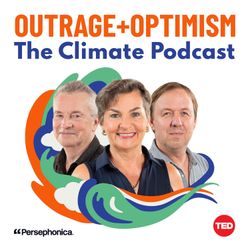
30. Beginning the Year With Ancestral Wisdom
40:58||Season 12, Ep. 30As billions around the world mark the beginning of a new year, many are pausing to ask the same questions: what do we carry forward, and what do we leave behind, as we cross from the old into the new? And as headlines fill with predictions about the rise of artificial intelligence, could a different kind of AI - ‘ancestral intelligence’ - offer insights equal to the depth of the climate and biodiversity crises we now face?This year’s COP saw Indigenous and First Nations Peoples better represented than ever before; but it also showed how far there is still to go to include them in meaningful dialogue. In a conversation recorded at COP30, Christiana Figueres sits down with two Indigenous leaders from different continents and traditions: Mindahi Bastida, from the Otomí-Toltec peoples of Mexico, and Atawévi Akôyi Oussou Lio, Prince of the Tolinou people of Benin. Together, they explore a relationship with the living world grounded in belonging rather than dominance, continuity rather than short-termism, and reciprocity rather than extraction.Tom Rivett-Carnac and Paul Dickinson then join Christiana to reflect on what it means to carry this wisdom into the year ahead. And if the challenges before us are not only technical and political, but also cultural and spiritual, how might that reshape the way we act, decide, and lead in 2026 and beyond?🎤 Leave us your voice notes and questions for upcoming episodes on SpeakPipeJoin the conversation: Instagram @outrageoptimism LinkedIn @outrageoptimismOr get in touch with us via this form. Producer: Ben Weaver-HincksPlanning: Caitlin HanrahanAssistant Producer: Caillin McDaidExec Producer: Ellie CliffordThis is a Persephonica production for Global Optimism and is part of the Acast Creator Network.
29. Why Beauty Matters in the Climate Crisis
45:23||Season 12, Ep. 29At a moment when the world feels noisier, faster, and more demanding than ever, what role can beauty play in helping us slow down, reconnect, and remember what matters?As the year draws to a close, Christiana Figueres, Tom Rivett-Carnac and Paul Dickinson step back from targets, timelines and political headwinds to explore how craft, design and the quiet appreciation for our objects and spaces can shape both the worlds we live in, and the futures we are trying to build.Tom is joined in Bath by designer and artist Patrick Williams, founder of the design studio and workshop Berdoulat, whose work is rooted in traditional craft, natural materials and a deep sensitivity to place. Together they reflect on what happens when efficiency crowds out care, when buildings and objects lose their connection to human bodies and natural rhythms, and why the climate crisis may also be a crisis of beauty.As we reflect on a challenging year for climate action, we also offer an invitation for the days ahead: to slow down, to notice what restores us, and to remember that meaningful change is sustained not just by effort, but by care, beauty and joy.Learn more:📖 Find out more about Patrick’s upcoming book release, The House Rules 🎤 Leave us your voice notes and questions for upcoming episodes on SpeakPipeJoin the conversation: Instagram @outrageoptimism LinkedIn @outrageoptimismOr get in touch with us via this form. Producer: Ben Weaver-HincksPlanning: Caitlin HanrahanExec Producer: Ellie CliffordThis is a Persephonica production for Global Optimism and is part of the Acast Creator Network.
28. Follow The Money: Who’s driving climate disinformation?
43:50||Season 12, Ep. 28At the very moment we need clarity and trust, information integrity is being polluted. Disinformation is profitable and the impact on truth is dangerous. Nowhere is this more obvious than in the discourse around climate.This week, Outrage + Optimism steps into the murky, fast-moving world of climate disinformation. Not simply misunderstanding and confusion, but the deliberate shaping of narratives to delay action, fracture trust, and profit from doubt.Christiana Figueres, Tom Rivett-Carnac and Paul Dickinson explore why disinformation is accelerating just as the climate stakes are rising, how it feeds on human psychology, and why the erosion of shared facts may be one of the greatest barriers to collective climate action.Paul brings us a conversation from COP30 with Jake Dubbins, a leading voice at the intersection of advertising, climate and human rights. Together they unpack how fossil fuel advertising, opaque algorithms and the attention economy are shaping what we see, what spreads, and what stalls climate action. And they examine the newly launched Declaration on Information Integrity on Climate Change, a first-of-its-kind effort at the international level.But can governments, platforms and advertisers clean up a poisoned information space without sliding into censorship? And where should the line really be drawn between free expression and preventing harm?Learn more:🛡️ Read the Declaration on Information Integrity on Climate Change📊 Explore the OECD report on disinformation and misinformation🔍 Find out about the Conscious Advertising Network and Climate Action Against Disinformation🎤 Leave us your voice notes and questions for upcoming episodes on SpeakPipeJoin the conversation: Instagram @outrageoptimism LinkedIn @outrageoptimismOr get in touch with us via this form. Producer: Ben Weaver-HincksPlanning: Caitlin HanrahanAssistant Producer: Caillin McDaidExec Producer: Ellie CliffordThis is a Persephonica production for Global Optimism and is part of the Acast Creator Network.
27. Paris, 10 Years On - Has it Changed the World?
49:05||Season 12, Ep. 27Ten years ago, a gavel dropped in a conference hall north of Paris. It was the moment the world agreed on a strategic plan for one of the most consequential transformations in human history. But, a decade later, what has the Paris Agreement truly delivered?Christiana Figueres, Tom Rivett-Carnac and Paul Dickinson pull back the curtain on the moment that changed global climate politics. The emotional reality of that night, the fragile trust built after the failure of Copenhagen, and the architecture of cooperation that still shapes the world today.Looking back, they ask: was it diplomacy’s greatest breakthrough, or the beginning of a myth we still rely on? Can an agreement built on voluntary commitments survive as the world becomes increasingly fragmented? Is the Paris Agreement still our best chance at limiting the impacts of climate change - or simply the only chance we have?Learn more:▶️ Watch Christiana’s Ted Talk 💌 Read Christiana’s Open Letter of Gratitude🌱 Read The Future We Choose, by Christiana Figueres and Tom Rivett-Carnac🌍 Dive into the Profiles of Paris - including contributions from Tom, Paul, and many former guests of the podcast🎤 Leave us your voice notes and questions for upcoming episodes on SpeakPipeJoin the conversation: Instagram @outrageoptimismLinkedIn @outrageoptimismOr get in touch with us via this form. Producer: Ben Weaver-HincksPlanning: Caitlin HanrahanExec Producer: Ellie CliffordThis is a Persephonica production for Global Optimism and is part of the Acast Creator Network.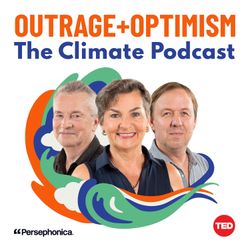
26. Jacinda Ardern and… Is It Time to Talk About Geoengineering?
47:59||Season 12, Ep. 26This week, hosts Tom Rivett Carnac and Paul Dickinson delve into the rapidly emerging - and faintly surreal - world of solar geoengineering. Politico journalist Karl Mathiesen joins us to unpack his investigation into Stardust, a VC-backed startup claiming it’s ready to spray particles into the stratosphere. Karl explains why this technology is suddenly attracting serious money, why scientists still have major questions about safety and side effects, and how in some places, the global regulatory landscape is almost nonexistent.And from technological disruption to political stability, former New Zealand Prime Minister Jacinda Ardern, reflects on the leadership we need. She’s unflinchingly honest about why so many politicians still choose “fear and blame” over long-term action, and why climate remains New Zealand’s “nuclear-free moment.” A test of political character as much as policy. Her argument is hopeful: people, she insists, are ahead of their politics.As we march towards the end of 2025, these conversations map the terrain of 2026: technologies racing ahead, governance lagging behind, and a public increasingly hungry for leaders willing to act with integrity. If you want to understand where the climate fight is really heading this episode is essential.Learn more:📚Read The Strange and Totally Real Plan to Blot Out the Sun and Reverse Global Warming👂Listen to our episode with Ricken Patel🎤 Leave us your voice notes and questions for upcoming episodes on SpeakPipeFollow us on social media for behind the scenes moments and to watch our videos:Instagram @outrageoptimismLinkedIn @outrageoptimismOr get in touch with us via this form. Producer: Ben Weaver-HincksPlanning: Caitlin HanrahanExec Producer: Ellie CliffordThis is a Persephonica production for Global Optimism and is part of the Acast Creator Network.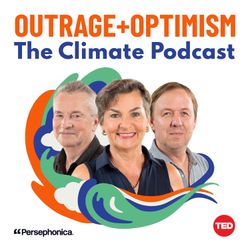
25. Kim Stanley Robinson on Pre Traumatic Imagination and the stories that change us
36:35||Season 12, Ep. 25This week on Outrage + Optimism, we’re taking a breath.After two intense weeks of daily updates from COP30 in Belém, we’re returning to weekly programming with something different - a slower, deeper, more reflective conversation that felt too valuable to cut.While in the Blue Zone, we sat down with Kim Stanley Robinson, the acclaimed author of The Ministry for the Future, 2312, The Mars trilogy, and the Science in the Capital series. His writing has been read by negotiators, ministers, campaigners, and many of you.In our conversation, Kim Stanley Robinson reflects on why The Ministry for the Future begins with such a devastating opening chapter, a “punch in the gut” designed to reveal the human limits of adaptation. He introduces the idea of “pre-traumatic syndrome,” the unsettling clarity that comes from imagining a catastrophe before it happens, and how this can motivate us rather than paralyse us. We explore storytelling as a cultural tool for moving from despair to determination, and why each of us needs a a unifying purpose that gives shape to our actions in a chaotic world.At a COP defined by urgency, exhaustion, and flashes of courage, this wide-ranging conversation with Kim Stanley Robinson felt like a necessary exhale, a moment to step back and reflect on why we do this work, and what kind of future we’re choosing to build.We’re airing the conversation almost exactly as it happened.🎤 Leave us your voice notes and questions for upcoming episodes on SpeakPipeFollow us on social media for behind the scenes moments and to watch our videos:Instagram @outrageoptimism LinkedIn @outrageoptimismOr get in touch with us via this form. Series Producer: Ben Weaver-HincksPlanning Producer: Caitlin HanrahanEdited by: Miles MartignoniExec Producer: Ellie CliffordThis is a Persephonica production for Global Optimism and is part of the Acast Creator Network.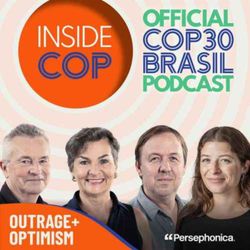
24. Inside COP: The Final Hours of COP30 - and the road ahead
37:49||Season 12, Ep. 24This is our final episode of Inside COP. For two weeks we’ve tried to bring you as close as possible to the heart of COP30 - the pace, the pressure, the progress, and the perspectives of those working inside and around the process.The closing plenary on Saturday began amid unexpected tension. Already running a day behind schedule, the Presidency moved to adopt the final text, but proceedings were paused following questions over whether all interventions had been properly registered. What followed were hours of clarification, consultation and procedural back-and-forth, underscoring concerns among many developing countries who had negotiated through the night to secure their priorities.In this episode, Christiana Figueres, Tom Rivett-Carnac and Paul Dickinson examine how the final day unfolded, what was agreed, and what it might mean.But this COP was never just about negotiation. Beyond the formal process, we explore what COP30 revealed about wider trends: shifting clean-energy economics, accelerating deployment across regions, and emerging signs of how the decline of fossil fuels is beginning to influence global decision-making.🎤 What do you want to hear on Outrage + Optimism? Ask us on SpeakPipe or on our socials where you can also see more behind the scenes moments and to watch our videos:Instagram @outrageoptimism LinkedIn @outrageoptimismOr via this form.Lead Producer: Ben Weaver-HincksPlanning Producer: Caitlin HanrahanEdited by: Miles MartignoniExec Producer: Ellie CliffordWith thanks to Groundswell and Global Optimism.This is a Persephonica production for Global Optimism and is part of the Acast Creator Network.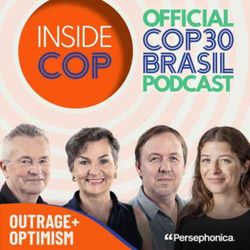
23. Inside COP: Friday Night in Belém - uncertainty in the Blue Zone
38:16||Season 12, Ep. 23We recorded this episode across Friday afternoon and deep into the evening inside the Blue Zone at COP30. At the time of publishing, there is still no final deal. The negotiations are ongoing, positions are shifting, and the outcome remains uncertain. We know that by the time you listen, some of what we heard today may already have changed, but we decided there was value in sharing the day with you. This episode is meant as a time capsule.We wanted to bring you inside the atmosphere of a COP Friday: the outrage, the optimism, the urgency, and the sheer human effort that goes into trying to land a deal. Rather than wait for the dust to settle, we spoke to the people living this moment. City leaders. Climate diplomats. Ministers from the front lines. Seasoned negotiators who’ve been in this process for decades. Activists still fighting for the best possible outcome for the planet. Their perspectives were captured as they were living this day, not in hindsight.This episode captures the feeling of a COP Friday: the confusion, the determination, the fear of losing ambition, and the belief, still alive in many corners, that progress is possible if countries choose it.With thanks to those who spoke with us:Eric Garcetti, former US Ambassador to India and former mayor of LA Mark Watts, CEO of C40Matt Webb, Associate Director for Global Clean Power Diplomacy, E3GGustavo Pinheiro, Senior Associate, E3GIrene Velez Torres, Colombian Minister for Environment and Sustainable Development and head of the Colombian delegationDr. Antwi-Boasiako Amoah, Ghanian Negotiator and incoming head of Africa Group of Negotiators (AGN)Giovanni Maurice Pradipta, Foundation for Sustainability 🎤 What do you want to hear on Inside COP? Ask us on SpeakPipe or on our socials where you can also see more behind the scenes moments and to watch our videos:Instagram @outrageoptimism LinkedIn @outrageoptimismOr via this form.Produced and edited by: Caitlin Hanrahan and Ben Weaver-HincksAdditional editing by: Miles MartignoniExec Producer: Ellie CliffordWith thanks to Groundswell and Global Optimism.This is a Persephonica production for Global Optimism and is part of the Acast Creator Network.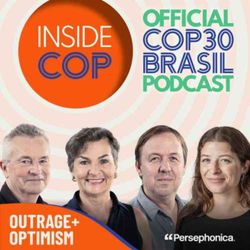
22. Inside COP: Friday Morning in Belém - what’s changed and why it matters
15:40||Season 12, Ep. 22It’s Friday morning in Belém and COP30 is moving fast. After yesterday’s fire and the overnight closure of the venue, the Brazilian Presidency worked through the night and released a new draft text early this morning. It has immediately triggered significant pushback.In this emergency episode the team talks through what changed overnight, and why so many countries are unhappy. Christiana Figueres highlights how the new text removes the roadmaps for transitioning away from fossil fuels and for halting deforestation, and why that has triggered such a strong response.The mood on the ground has shifted. Delegates are back after the disruption yesterday, rested just enough to be energised, and preparing to make their views known in plenary. The Presidency now has to listen, absorb, and decide how far it can move.This is our Friday morning take on a rapidly changing situation, the snapshot before whatever comes next. Follow us on social media across the day for real time updates from Belém.Instagram @outrageoptimism LinkedIn @outrageoptimismLearn more:📣 Read the latest draft of the Political Package🧩 Use this helpful cheatsheet on how to read a COP text🌍 Check out the official COP30 website for background and announcements🎤 What do you want to hear on Inside COP? Ask us on SpeakPipe or on our socials where you can also see more behind the scenes moments and to watch our videos:Instagram @outrageoptimism LinkedIn @outrageoptimismOr via this form.Lead Producer: Ben Weaver-HincksPlanning Producer: Caitlin HanrahanEdited by: Miles MartignoniExec Producer: Ellie CliffordWith thanks to Groundswell and Global Optimism.This is a Persephonica production for Global Optimism and is part of the Acast Creator Network.